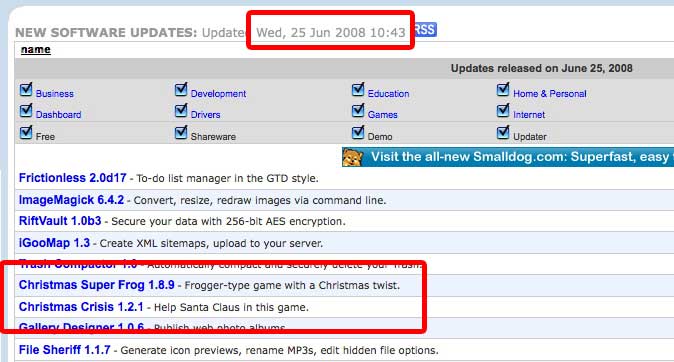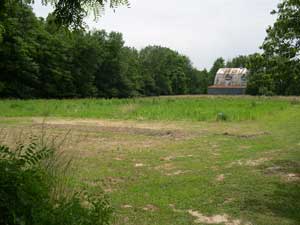mathdittos2.com
...dedicated to...hmmm, we're still figuring that one out... |
|
The Phoenix Mars Lander has discovered what NASA scientists believe is evidence of water ice just under the surface of the red planet. Space.com's Clara Moskowitz tells the story in Mars Scientists: It Must Be Ice. The Astronomy Picture of the Day site also depicts the story well in two postings from last week, Phoenix Digs for Clues on Mars and Vanishing Act. The "evidence" for the find is shown below is a pair of photos where the possible water ice was exposed in a trench cut by the lander's scoop and "exposed to sunlight and the thin, dry Martian atmosphere." (Note, I circled the areas in question and lightened them a bit.) NASA believes the water ice sublimated, a process similar to evaporation, in which the ice goes directly from solid to gas. Image credits: NASA/JPL-Caltech/University of Arizona/Texas A&M University Both the Jet Propulsion Laboratory and NASA are providing pages on the Phoenix Mars Lander. Helping Immigrant Parents Become More Involved Margaret Farley Steele has a good story about what one high school and community did to help immigrant parents be more involved in their children's schooling in Breaking Down Barriers to Get Parents Involved. Some Schools Saying Goodbye to Mystery Meat Los Angeles Times staff writer DeeDee Correll tells of some schools moving to fresh meat and locally grown produce in an effort to improve school cafeteria lunches. In Schools are taking the mystery out of the meat they serve, Correll writes, "The precooked beef patties with the fake charcoal lines won't be on the menu at Castle View High School this fall." She tells of several schools overcoming the obstacles of handling fresh meat and also adding locally and sometimes organic produce to their cafeteria fare. For veterans of many years of school cafeteria lunches, the line about "precooked beef patties with the fake charcoal lines" makes the column worth the read! Another item in the LA Times, An intimate L.A. Unified meal for 75,000, gives their recipe for Beef Teriyaki and Steamed Rice Bowl. California Homeschooling Decision to be Reconsidered The California Second District Court of Appeal in Los Angeles will meet today to reconsider its February ruling that required in-home instructors to have teaching credentials. In Court to revisit ruling on homeschooling, San Francisco Chronicle writer Bob Egelko relates, "After a clamor by homeschooling partisans, and a promise by Schwarzenegger to change the law if necessary to authorize home instruction, the court took the unusual step of calling a new hearing and inviting arguments from education groups, state officials and other parties." The Court has ninety days to issue a ruling. Send Feedback to |
|
Retention Winnie Hu has a good article today in The New York Times, Holding Back Young Students: Is Program a Gift or a Stigma? It's all about the old retention vs. something else (social promotion, special remediation...) discussion. Hu tells of the East Ramapo school district in New York that has decided to retain around 12% of their first graders this year and place them in special groups next year. "The special classes, which are limited to 15 students and follow a pared-down curriculum of reading, writing and arithmetic, are called the Gift of Time and come with extras like tutoring and field trips to a local farm." This is the second year of the Gift of Time program. The students retained last year made significant gains in their second year of first grade with "nearly 80 percent of the 54 first graders and 47 second graders...now read at grade level." Hu also notes that "many education experts say it doubly stigmatizes vulnerable children by combining two practices widely discredited by research: retention and tracking low-achievers." My experience with such practices has been pretty much positive. In the last school system I taught in, the program was called a "half-step" class and later the "readiness room." Limited class size with a skilled educator and a narrowed focus on basic skills tailored to each child's needs made the extra year at a grade well worth any negatives associated with the retention. My last few years of teaching in Indianapolis (1978-81), I taught in a program where all kindergarteners were screened for developmental delays. The high risk kids were placed in special, regular education classes the following year(s) that used an Orton-Gillingham variant for teaching reading. The classes were supervised by committee, with staffings held weekly to review the progress of each student. While it sometimes felt like teaching in a fishbowl, the added support and scrutiny made the difference for the kids. The program ran through third grade (when necessary, some kids returned to the regular classroom after first or second grade). At the end of third grade, some students were ready to move to a regular fourth grade classroom, while others were retained into a regular third grade classroom, and yet others were placed in special education classes. Kids Hack High School Grades Hacking Case Jolts Affluent California High School tells a pretty sad story about two high school seniors who hacked their and others' grades. They apparently will pay some serious adult penalties. Many States Forego Abstinence Education Grants A number of reports online today note that many states are no longer accepting federal abstinence only education grants. Most of the reports such as States turn down US abstinence education grants say the states feel the program is too limited and not as effective as complete sex education programs. Indiana, of course, is still accepting the grant money. Nice Days
Our garden is a bit dry, but productive. We've had lots of great cauliflower, lettuce, and some broccoli. The main broccoli harvest is just coming on with soccer ball sized heads. We cut the main heads, fertilize the plants heavily with compost, when available, and 12-12-12 when the compost is short, and cut side shoots for several weeks before pulling the plants. It appears the plants above are about ready to be sprayed again with Thuricide We've also had some beautiful sunsets with clouds from afternoon thunderstorms (that have missed us both north and south).
Ritalin ScienceDaily has an interesting article about a study published this week in which researchers "David Devilbiss and Craig Berridge report that Ritalin fine-tunes the functioning of neurons in the prefrontal cortex (PFC) - a brain region involved in attention, decision-making and impulse control - while having few effects outside it." How Ritalin Works In Brain To Boost Cognition, Focus Attention and the University of Wisconsin-Madison press release state that "by helping pinpoint Ritalin's action in the brain, the study should give drug developers a better road map to follow as they search for safer alternatives." For those of us who work with children on ritalin or similar medications, this one's an interesting read. A short blurb on eSchool News, You won't have to campaign hard to get students to use this interactive learning tool, directed me to the intriguing game, eLECTIONS. It's an online board game modeled after The Game of Life in which participants run their own presidential campaign. Candidates pick their party, issues, and plan which states to visit and how much of their funds to spend. I didn't find any slanting in this game one way or the other. But...I got thumped badly by the Republicans when I tried the game against the computer. Do note that if you're on a Mac, you'll have a better experience with Safari than Firefox on this one. Sara Rimer writes today in The New York Times about the Urban Assembly New York Harbor School in Taking Lessons, and Confidence, From the Water. The school's mission "is to raise academic achievement by connecting students with the harbor that surrounds the city." From the school's web site:
Study on Elementary Math Prep AP writer Nancy Zuckerbrod tells about a study released today by the National Council on Teacher Quality in Study: Teachers not being taught math properly. The report looked at 77 elementary education programs around the country and "found the programs, within colleges and universities, spend too little time on elementary math topics." More Teacher (and Student) Resource Sites I've run across a number of new (to me) resource sites recently, many brought to my attention via the DOE RSS feed and the FREE government resource site.
Christmas in June? While checking MacUpdate for, what else, but updates to Mac software, I thought for sure I'd seen the word "Christmas" as I quickly scanned the list of updates yesterday. Upon closer examination, there were indeed two postings for Christmas games in the listing! When I checked the comments on Christmas Super Frog and Christmas Crisis, I found that the developer of these free games posts updates to them throughout the year. MacUpdate users seem to have a lot of fun posting comments such as "Christmas? It's March!" I also ran across John C. Welch's blog posting, Acrobat 9 is out...BOHICA for you dirty hippy Mac users. I had to look up the acronym "BOHICA!" Since I've been through this stuff before with previous Adobe releases, I felt John's pain. I also had to smile at Bryan Maleszyk's posting, Hello, I’m a Mac. He's a relatively new Mac users just learning to love the hardware and software...and to hate the company a bit! Been there, done that, too! For balance, I guess I really should give a link to Apple Tops Consumer Reports' Tech Support Survey from Low End Mac. I hope you're having a great summer break. I am. I think I'm going to go back to eLECTIONS and try to beat the Republicans this time. More Math, Please A poll conducted by the Associated Press June 18-23 revealed that "a large majority of Americans think schools are placing too much emphasis on the wrong subjects." In Poll: Math, yes; standardized tests, maybe, the AP's Nancy Zuckerbrod relates that more than a third of those surveyed said more math was needed with more English a distant second. Other subjects mentioned were art, music and the sciences. "More than half think they're doing just a fair job in preparing children for the work force or giving them the practical skills they need to survive as adults." It's interesting that of those surveyed, reading didn't seem to make a blip on their radar. Free, Online Reader for Visually Impaired A posting on ScienceDaily, Online Service Lets Blind Surf The Internet From Any Computer, Anywhere, led me to the alpha release of Web Anywhere. From their home page:
I didn't have much luck getting Web Anywhere to work on my machine, but this web application is one well worth watching, as it could prove helpful to limited reading proficiency students as well as for the visually impaired for whom it was designed. No Child Left Inside Act An item from the Cumberland Times-News by Jennifer Raley, U.S. bill proposes funding for outdoor education, discusses the current status of the No Child Left Inside Act, an amendment to the proposed reauthorization of the No Child Left Behind Act. The House Education and Labor Committee approved an amended version of the No Child Left Inside Act on June 18.
Also see: Because NCLI is currently framed as an amendment to NCLB (I think we're in acronym hell!), I'm not sure there's really much hope for passage until after the November election. I've included the story and info above, as environmental education and outdoor education are some of those things that just seem to get left out in our current high stakes testing national mentality. A charter school in our area, the Rural Community Academy, features an educational program using a place-based approach. Lessons include "careful attention to the social dynamics and cultural values of the rural setting," along with including our beautiful rural setting or instruction "and continuous interaction with the local community." I think that may translate into a strong emphasis on environmental education as well. From RCA's Curriculum page:
There's a warm place in my heart for RCA, as it is housed in the old Graysville Elementary building that was closed by Southwest School Corporation a few years ago in a cost cutting move. Our youngest daughter attended there from grades 2-6. ISS Growth Today's Astronomy Picture of the Day includes links to other APODs of the International Space Station, showing its progress over the last six years.
While on the subject of space, there's a new posting on Science@NASA, NASA to Attempt Historic Solar Sail Deployment. "NanoSail-D will be the first fully deployed solar sail in space, and the first spacecraft to use solar pressure as a primary means of attitude control or orbital maneuvering," says Sandy Montgomery of the Marshall Space Flight Center.
Even when I had a "small" 40 acre farm, I used intensive gardening practices for some of our vegetables. I was introduced to the practice via the old WGBH/PBS TV series, Crockett's Victory Garden. The late James Underwood Crockett demonstrated how it was actually easier in some instances to grow vegetables in a tight planting regimen as opposed to the traditional long, single row. Crockett recommended raised beds about three feet wide so that one could reach any area of the intensive plot without stepping into the bed. Our situation currently doesn't fit that model, but we use another Crockett recommendation, planting boards, to access the intensive bed in wet weather. I keep one or two treated boards handy to lay between the narrowly spaced vegetables to walk on when I access the bed from the non-raised side.
We manage to keep our weeding down quite a bit in both the intensive plot(s) and the regular garden by using grass clippings from the yard to mulch in the crops. I generally let the clipping lie and dry a day before gathering them with the lawn sweeper and applying them around the veggies. (Tip to smokers: Don't smoke in the garden with dry grass clippings applied!) And yes, it takes a lot of grass clippings to mulch a big garden. We own just over an acre, but mow around three acres, as we take care of the barn and pond lots next door for the owner. That makes for a lot of clippings. Do be aware that you can bring in all kinds of nasty weed seeds in your grass clippings. Also, if you use any herbicide lawn treatments on your yard to kill weeds, the clippings may contain some residue of the herbicides that could adversely affect your vegetables. Even on our current property, we don't have to intensive garden, as we have lots of space available. I just find it easier to do so with things like carrots, beets, onions, and lettuce. Some crops, such as the potato trenches shown below, don't favor intensive culture.
A lot of Jim Crockett's practical gardening wisdom is still available through Amazon You can easily find lots more information on intensive gardening online via a Google search. Some good ones include:
Ads shown on this site do not represent an endorsement or warranty of any kind of products or companies shown. Ads shown on archive pages may not represent the ads displayed in the original posting on Educators' News. |
| Previous Week |
©2008 Steven L. Wood

















 In the photo at right (from right to left), we have double rows sweet white onions, baby carrots, beets, and then a single row of storage onions. We leave about 4-5 inches between the double rowed vegetables with 8-12 inches separating the rows.
In the photo at right (from right to left), we have double rows sweet white onions, baby carrots, beets, and then a single row of storage onions. We leave about 4-5 inches between the double rowed vegetables with 8-12 inches separating the rows.
 We also received permission this year to use part of a field next door the farmer chose to leave fallow. By the time things dried out enough to work the ground, it was way too late to plant sweet corn, which was my original plan. So for now, there's just one lonely bunch of watermelon transplants in the area. I'll probably fill out the row with whatever vine crop transplants I can find at the garden store that might still mature before fall (cantaloupe, squash, ??).
We also received permission this year to use part of a field next door the farmer chose to leave fallow. By the time things dried out enough to work the ground, it was way too late to plant sweet corn, which was my original plan. So for now, there's just one lonely bunch of watermelon transplants in the area. I'll probably fill out the row with whatever vine crop transplants I can find at the garden store that might still mature before fall (cantaloupe, squash, ??).



